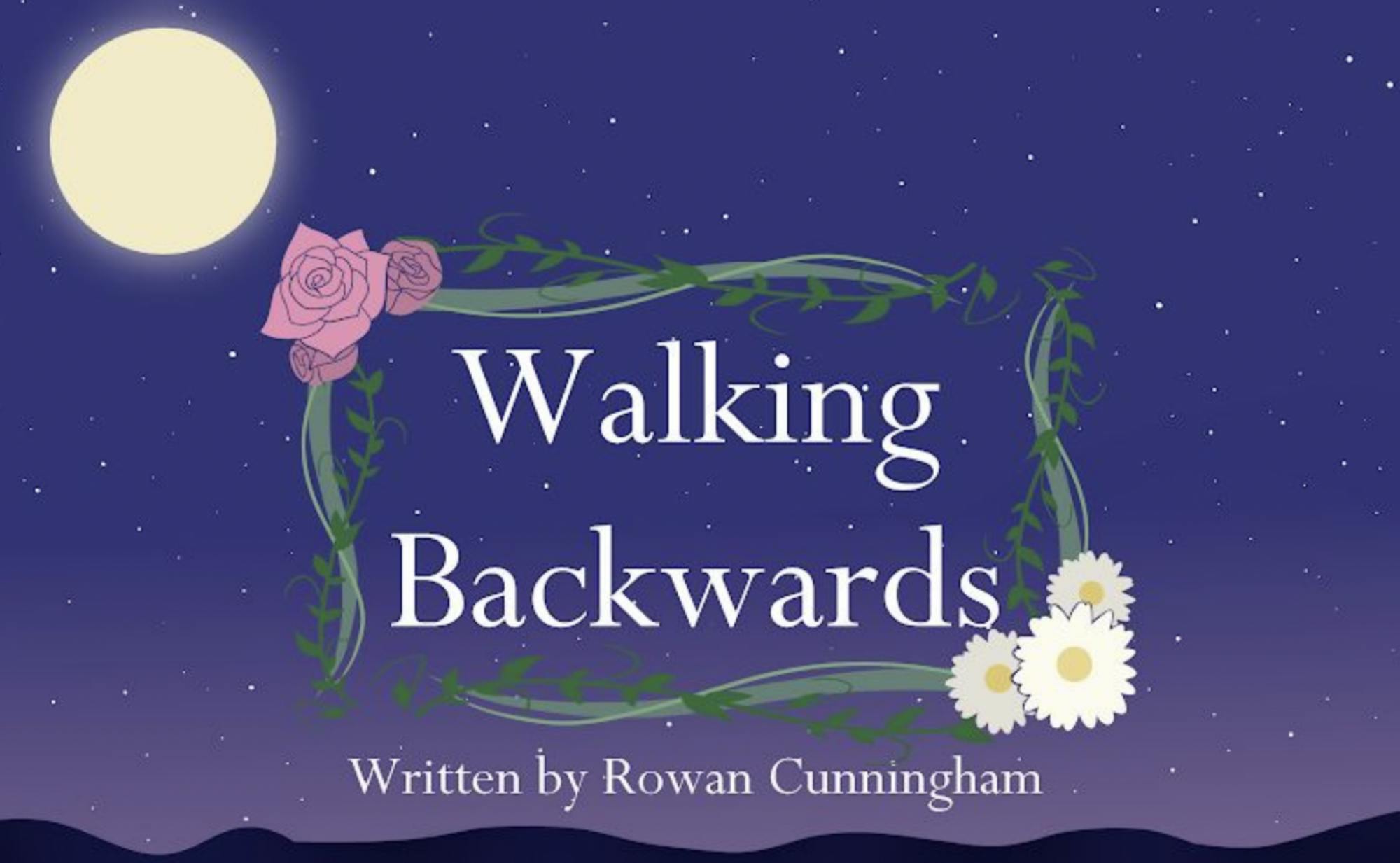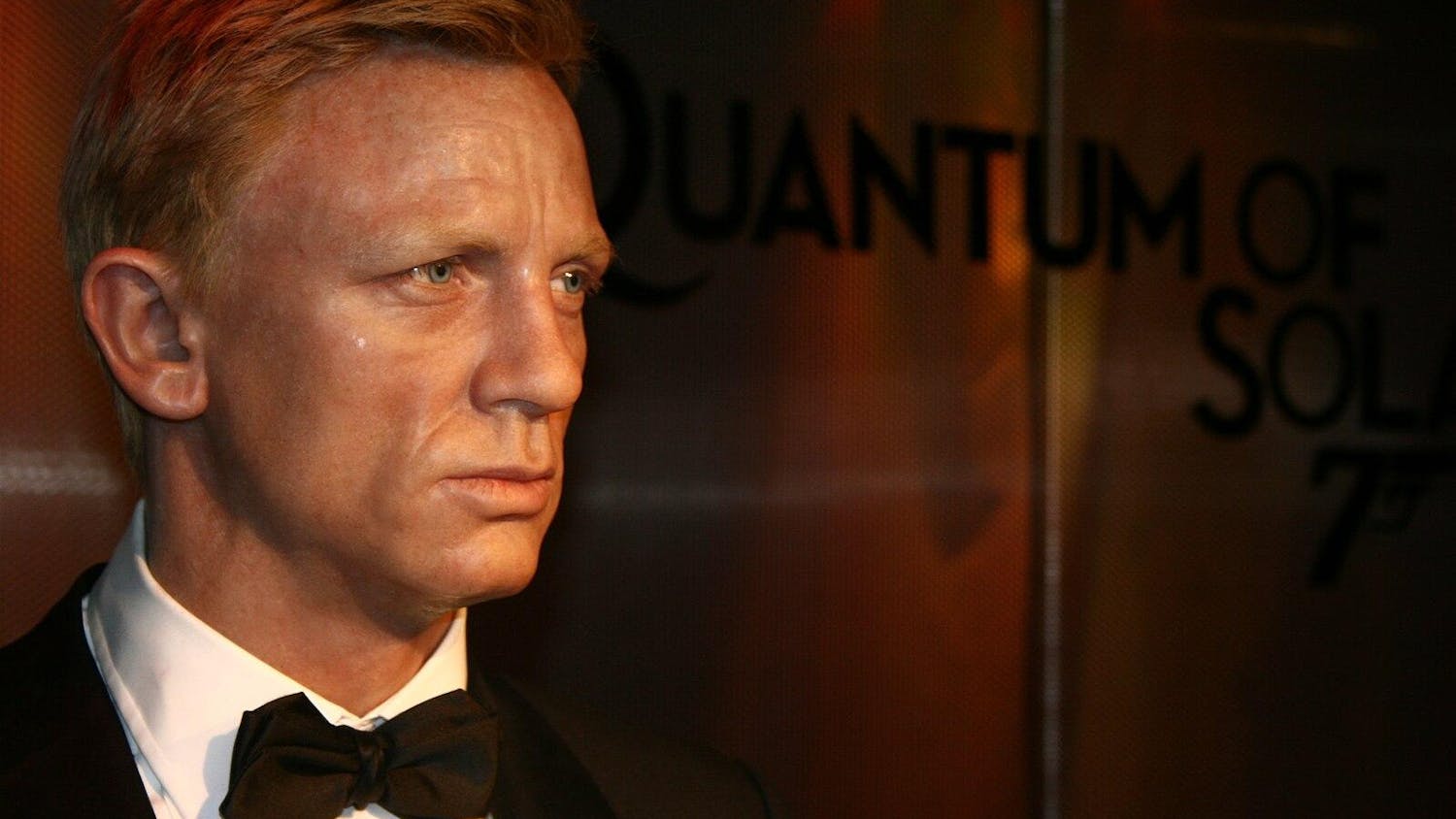Note: This article contains some spoilers for “Walking Backwards.”
“Walking Backwards” is an original play written and directed by Tufts sophomore Rowan Cunningham. The two-act show ran as a staged reading in Paige Hall on Feb. 15 and 16 and tells the story of found family, growth and all that comes with being a queer and transgender person moving through life. (Note: Cunningham read as Rose for the performance of this review).
Cunningham utilizes an interesting storytelling tool for this show: reverse chronological order. While many writers have attempted to use a similar storytelling device, Cunningham weaves it in ways that beautifully enhance the viewer experience. We watch from Rose’s freshman year, to her time as a young child, to her birth and beyond in the span of about 90 minutes. As the story continues to unravel, the shape of the human experience becomes more clear and enticing.
This production itself was very minimal, with scripts in hand, a projected slide show and few set pieces throughout. As such, the highly immersive show was able to focus more on building a meaningful connection between its characters and audience.
The play begins with Rose, a transgender woman and college freshman, fighting with her father, Scott (Luc Brown), as she refuses to go home for Thanksgiving, preferring to stay
on campus with her new found family and college friends Sam (Margaret Hines) and Grant (Carter Ashmun).
Act 1 focuses on Rose and her relationships with her father and friends throughout her life. Rose’s complicated relationship with her father and love for Sam and Grant are established from the start. Throughout the first act, we watch Rose as a college freshman with a passion for acting, pushed to navigate a world that questions if she is a “real” girl. We see her develop deep connections with her roommate, Sam, and a sophomore theater major, Grant. We see her come into her own in a new world and find her place. We also continue to watch as she becomes younger, more new to the world she has yet to stake her claim on. We see her first friend, Bailey (Margaret Hines), coming out to Scott, the death of her mother, Daisy (Emma Look), and her childlike wonder for the world. As Act 1 ends, we watch as Daisy and Scott first welcome her into the world.
Act 2, on the other hand, closely follows Scott and his life. We watch as Scott nurses his relationship with his wife and mourns the loss of his friendship with Grant. We see his young adulthood, his own time in college and his childhood. The complexities of Scott become clear as we watch him come to meet, love and lose the people that shaped his life.
A major highlight of this production was Brown in the role of Scott. Brown puts on an amazing performance as a character with many layers we cannot understand completely until the very end of the show. Another standout performer was Ashmun. As Theo, Ashmun’s comedic timing takes the cake, as he easily breaks up heavy moments with his witty humor and joyous nature. The entire cast breathes life into the show with their seemingly natural chemistry and dynamics.
The show ends on a note many in queer theater cannot seem to hit — one of hope and love. The final scene is a pivotal moment that takes us right to the beginning (or perhaps the end) of the story. As the final details are laid out and the curtain is fully pulled back on our characters, we get a soft and sweet ending of new families being formed.
Part of what makes this show compelling are the many connections it draws between its characters and their place in time. The characters of Act 1 mirror those of Act 2, as if they all began at the same point but strayed slightly through small decisions which impacted the whole. A clear connection between all the characters was the off-campus lake the college students loved to frequent under the night sky. However, unlike their act two counterparts, Rose, Sam and Grant choose to stay at the lake together rather than leave as individuals.
Additionally, certain themes — flowers and rocks, forwards and backwards, friends and family — run deep in this story. The show is proof that what some may consider polar opposites are more closely intertwined than we may think. The growth of Rose, like flowers, cannot happen without the aid of love and rocks. Before you can move forwards, you have to go backwards. And the love of our friends is equally as important and powerful as the love for our family.
The most phenomenal part of this production is simply the writing. Cunningham wonderfully brings together the story of family and hardship in a way that is grounded, honest and heartfelt. The story hits all the needed beats, plot twists, dramas and monologues to a T, but it is broken up with humorous moments and dialogue in a way that is not overbearing.
The writing carefully captures the queer and trans experience, along with the struggles that come from the college transition. Rose and Scott grow and struggle in similar ways, as Rose navigates the ‘progressive’ New England theater scene and Scott comes to learn about his differences in a world of his peers. And yet, as specific as the writing and dialogue is, the story is universal.
“Walking Backwards” is not a glimpse into what queer student theater could be; it is a deep pry into what it should be and what it must be. It is a leap forward in its storytelling and power.
And, there is simply no doubt that the world needs to keep its eye on Cunningham to see what she does next.






